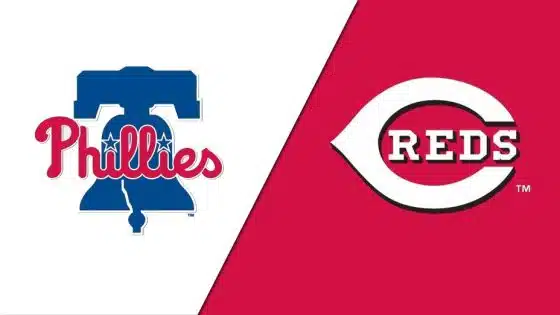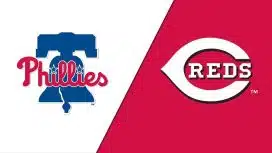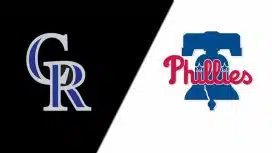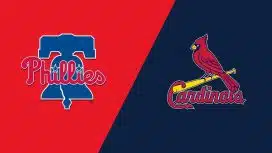By Tim Kelly, Sports Talk Philly editor
The 2018 Hall of Fame ballot is littered with difficult Hall of Fame cases. Barry Bonds and Roger Clemens appear to be gaining traction, but not without backlash – the latest from Hall of Famer Joe Morgan. Omar Vizquel is one of the most decorated fielders in the history of the sport, but it's unclear if his offensive numbers are strong enough to warrant induction. And Andruw Jones' peak is Hall of Fame worthy, but his quick decline complicates his Hall of Fame case.
Despite a deep ballot, one name that shouldn't be overlooked is Scott Rolen. Rolen isn't simply a case of someone that has a better case than one might think. Nope, Rolen's 17-year career left him with a perfect mix of dominant advanced statistics and traditional accolades that make him worthy of induction into the Hall of Fame.
The average bWAR for a Hall of Fame third baseman is 67.5, while Rolen's bWAR is 70.0. That bWAR trounces Hall of Famers Home Run Baker and Jimmy Collins. It comfortably tops contemporaries like David Wright and Evan Longoria. It's nearly double the career bWAR, thus far, of former American League MVP Josh Donaldson.
Popular: 7 Former Phillies Are On The 2018 Hall Of Fame Ballot
The average WAR 7 of a Hall of Famer is 42.8. WAR 7 is a statistic used to put a player's seven peak years in proper context. Rolen has a 43.5 WAR 7, which tops numerous Hall of Famers, including Paul Molitor.
Perhaps the most useful advanced statistic when evaluating a player's Hall of Fame case is JAWS. JAWS, which was created by Sports Illustrated's Jay Jaffe, is used "as a means to measure a player's Hall of Fame worthiness by comparing him to the players at his position who are already enshrined, using advanced metrics to account for the wide variations in offensive levels that have occurred throughout the game's history."
The average JAWS score of the 13 Hall of Fame third baseman is 55.2. Rolen tops that with a 56.8.
Rolen also passes many of the traditional tests that older school voters use to gauge a player's Hall of Fame worthiness. While he only finished in the top-five in MVP voting once (2004), he's not short on awards.
Between 1998 and 2010, Rolen won eight Gold Glove Awards, solidifying him as the best fielding third baseman of his era. Between that period, only the aforementioned Jones and his Hall of Fame teammate Greg Maddux – both of whom may be among the top five fielders in the history of their respective positions – won more Gold Glove Awards in the National League.
Trending: It Appears The Phillies May Not Be As High On Nick Williams As Some Are
Rolen was an All-Star seven times during his 17-year major league career. Using All-Star Game appearances to determine someone's Hall of Fame case is flawed for a couple reasons. The first is that fans can manipulate ballots to the point where they can vote an unlimited number of times. The second is that you can be an All-Star based off of the first three months of the season, and then completely collapse in the second half of the year. All-Star Game appearances shouldn't be entirely discounted, but they should be pretty far down the list of things that voters look at.
Of course, what voters should do and what voters actually do are two totally different things.
So, if we are to assume that some voters will value All-Star Game appearances more than they probably should, that actually would work in Rolen's favor. His seven All-Star Game appearances are only one less than Chipper Jones, who is a lock to be elected in his first year on the ballot this year. It's as many as the aforementioned Molitor. It's three more than Adrian Beltre, who is also a lock to be a first-ballot Hall of Famer at the conclusion of his career.
Other awards that Rolen won throughout his career include the 1997 National League Rookie of the Year and the 2002 Silver Slugger Award for National League third baseman. (Had he not played in the National League at the same time as Chipper Jones, he probably would have won a bunch more Silver Slugger Awards.)
A few things will work against Rolen, however.
The first is that with Jones likely to be inducted this year, all of the average advanced numbers for a Hall of Fame third baseman will increase. For example, Chipper Jones has an 85.0 career bWAR. If we assume that he's inducted this year, the average bWAR for a Hall of Fame third baseman will go from 67.5 to 71.5, a number that Rolen would fall slightly below. A similar effect will take place in the categories of WAR 7 and JAWS.
Hot: Phillies Reportedly Considering Chase Utley For Bench Coach
Still, if we look at these numbers based on the top 10 of all-time, Rolen finds his way into the top 10 in the history of third baseman for bWAR and JAWS. If we include, Jones, Beltre and all players that either haven't yet been inducted to the Hall of Fame or are still active, Rolen's 70.0 WAR is 10th all-time. His JAWS score of 56.8 is also 10th best in the history of third baseman.
Comparing players to those already in the Hall of Fame is one way to assess a player's Hall of Fame case, but certainly not the only method that should be used. If Chipper Jones and Beltre are elected to the Hall of Fame before Rolen, it shouldn't change Rolen's case. Rolen's numbers are Hall of Fame worthy before either of the two have had the chance to be elected to the Hall of Fame, and they will remain that way even after those two are elected.
What will probably hurt Rolen's chances of being elected to the Hall of Fame even more is that he burned some bridges throughout the course of his career.
The end of Rolen's tenure in Philadelphia was notably ugly. He turned down a 10-year/$140 million contract extension with the Phillies, forcing them to trade him to the St. Louis Cardinals, rather than losing him in free-agency after the 2002 season. (He had also reportedly turned down a seven-year/$90 million contract offer from the Phillies.)
Rolen's relationship soured with the two most important people in the organization at that time: general manager Ed Wade and manager Larry Bowa. Wade was reportedly unhappy with Rolen's not-so-private assertion that he didn't believe that the Phillies ownership group would put a competitive team around him, which was why he wasn't interested in re-signing. Bowa, at one point, wasn't on speaking terms with Rolen.
Top 25 Players To Ever Play A Game For The Phillies: No. 20, Cliff Lee
Suffice to say, Rolen didn't have many supporters left in Philadelphia when the club traded him to the Cardinals in July of 2002.
His tenure in St. Louis was fruitful, at least from an on-field sense.
In five-and-a-half seasons with the Cardinals, Rolen made four All-Star teams and won five Gold Glove Awards. The Cardinals made the playoffs four times during Rolen's tenure with the team, won two National League pennants and the 2006 World Series.
But like in Philadelphia, Rolen's tenure with the Cardinals ended in an ugly fashion.
Though it was never especially clear what Rolen was upset about, his relationship with Hall of Fame manager Tony La Russa went south at the end of his time with the Cardinals. In fact, he reportedly asked for a trade after La Russa received an extension at the end of the 2007 season.
Rolen eventually got that trade, as he was dealt to the Toronto Blue Jays prior to the 2008 season. Like Philly, he left St. Louis as someone that had been extremely productive, but struggled to maintain relationships within the organization.
Popular: Orioles Seem Unlikely To Retain Potential Phillies Target Manny Machado Past 2018
Should any personal problems that Rolen had in his career affect his Hall of Fame case? No. Will they? It probably won't help him, especially when you consider that he's not seen by many respective voters that simply do the "eye test" as a Hall of Famer.
The Hall of Fame, in the opinion of most younger voters, should measure individual greatness. But there are enough older Pro Football Hall of Fame voters that have kept Terrell Owens out of the Hall of Fame. Any perceived divisiveness that may have come with Rolen certainly pales in comparison to that distractions that often followed Owens throughout his career. But Owens is also one of the top five wide receivers in NFL history, and he's been kept out of the Hall of Fame for reasons other than his play.
Rolen's numbers speak for themselves. If voters closely examine his individual accomplishments and his place in history, he's worthy of induction. If they do the "eye test" and allow any personal feelings to impact their vote on Rolen, he's going to have a tough time building momentum.
While Rolen will no doubt face an uphill battle to make the Hall of Fame, he's deserving of induction today. And if he's still on the ballot in a decade, he'll be worth of induction then too.





